Introduction
Today, we’re diving into an important development in Canadian citizenship law—Bill C-71, introduced by Immigration Minister Marc Miller on May 23, 2024. This bill proposes significant changes to Canada’s citizenship laws, and it’s essential to understand what these changes mean for many Canadians and their families.
Background and Purpose
Bill C-71 aims to extend citizenship to many who were born outside of Canada to a Canadian parent in the second and subsequent generations. This is a direct response to a December 2023 Ontario Superior Court decision that found the 2009 amendment to the Citizenship Act unconstitutional. This amendment had created two classes of Canadian citizens—those who can pass on citizenship to their children and those who cannot.
The court has given the Federal government a deadline of June 19, 2024, to address this issue. Although Bill C-71 has been drafted and passed its first reading, it is unlikely to come into force before the deadline, meaning the government may need to request an extension.
Key Proposals of Bill C-71
Firstly, it will allow Canadian citizen parents born outside Canada to pass citizenship to their biological and adopted children born outside Canada. Children in the second and subsequent generations born abroad will now be able to apply directly for a Canadian citizenship certificate. Adopted children will be able to apply for a grant of citizenship and, once approved, obtain a Canadian citizenship certificate.
An important requirement under this new legislation is that some Canadians will need to demonstrate a substantial connection to Canada by spending at least 1,095 days here at any time before the birth or adoption of their child. However, details on what evidence will be needed to prove this substantial connection have yet to be provided.
It’s also worth noting that Bill C-71 has different requirements for retrospective and forward-looking cases. For children born after the legislation’s enactment, the substantial connection requirement applies. But for those born before the legislation comes into force, there is no substantial connection test.
Addressing “Lost Canadians”
The bill also aims to restore citizenship to any remaining “Lost Canadians.” These are individuals who lost or were unable to acquire Canadian citizenship due to specific sections of the Citizenship Act. This group includes descendants of women who lost their British subject status upon marrying nationals of certain non-Commonwealth countries.
Conclusion
In summary, Bill C-71 represents a significant step forward in Canadian citizenship law, addressing long-standing issues and extending citizenship to more people. However, we’ll have to wait for the bill to pass and for further details from Immigration, Refugees and Citizenship Canada. Stay tuned for more updates as this important legislation progresses.
—

